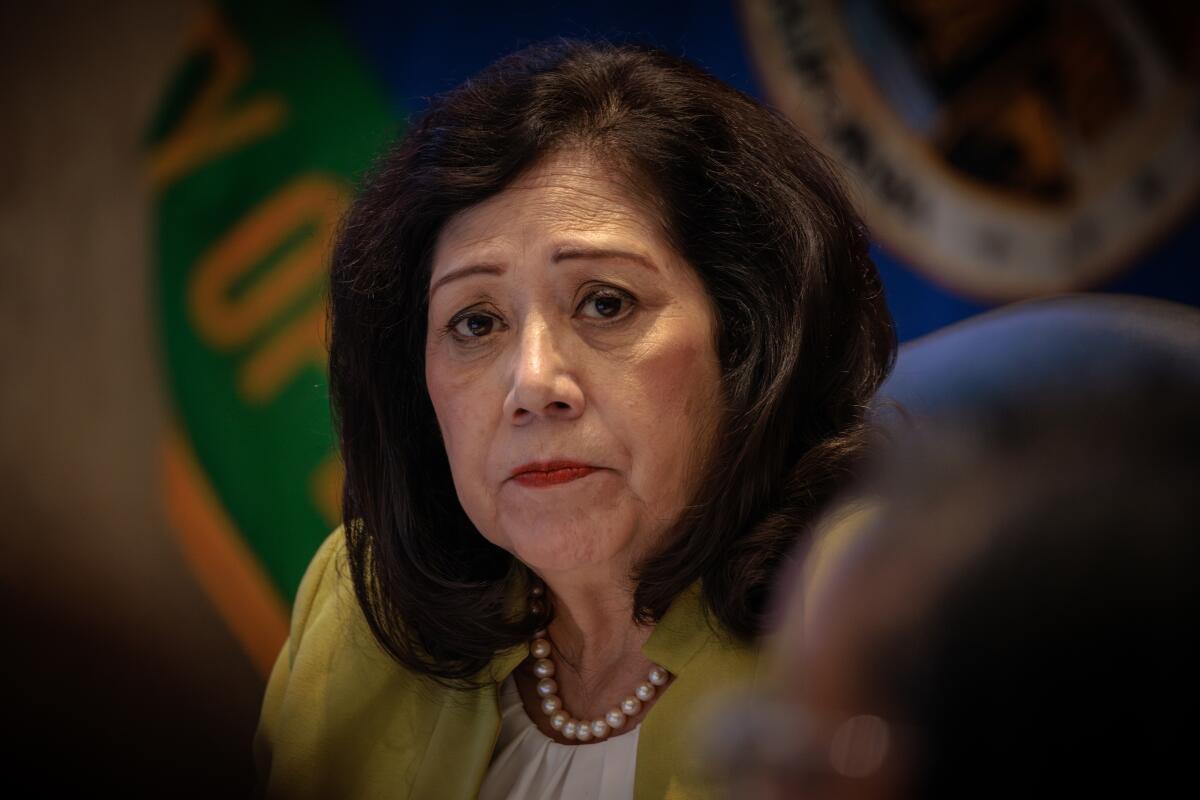Kids complained for years about sexually abusive probation officers. Some of them still work for L.A. County

- Share via
The girls said they were molested in bed and raped in an administrative office, leered at in the communal shower and surveilled in the bathroom.
If they told, they said, they were threatened with solitary confinement and revoked phone privileges. If they stayed quiet, they might get out a few weeks early.
Starting in the late 1990s, the complaints by young girls incarcerated at Camp Scott began to pile up — all alleging similar sexual abuse by the same man: Thomas E. Jackson, then a deputy at the Santa Clarita juvenile camp.
Eventually, the complaints all stalled. The girls finished their sentences and left. Jackson stayed for decades.
It wasn’t until this fall that Jackson resigned from the Los Angeles County Probation Department, capping a 33-year career during which 20 women say he sexually abused them when they were girls. His last day was Sept. 28.
Ernest Walker, a longtime probation supervisor, resigned two days later, also after 33 years with the department. His departure would come nearly two decades after he was accused of having sex with a teenage girl he supervised.
Faced with roughly 1,500 plaintiffs accusing the county of tolerating unchecked sexual abuse at its juvenile facilities, the Probation Department has spent the last two years removing alleged sexual abusers from its ranks. Since early 2022, 23 probation staffers — including Walker and Jackson — have been placed on leave after accusations of sexual violence, according to figures provided by the county’s outside counsel.
Irvine attorney Courtney Thom, whose firm represents roughly 150 clients suing the county, said she found the sheer number of alleged predators employed until recently by the county “revolting.”
“It makes my stomach sink,” said Thom, a former sex crimes prosecutor. “To hear that number — and I guarantee it’s probably double if not more — it just shows how irresponsible the county is.”
Of the 23, the county’s lawyers say one employee has been fired, and two identified by The Times as Walker and Jackson, have resigned.
Neither Walker nor Jackson has been criminally charged. Tom Yu, who represents Walker, said his client had retired after three decades “in good standing” and called the allegations that he had sex with a minor “patently false.” Jackson did not respond to calls or a letter left at his home.

The crackdown can be traced to the 2019 passage of the Child Victims Act, a state law that gave victims of childhood sexual abuse a new window to sue. Four years later, L.A. County — with its sprawling network of foster homes, children’s shelters and probation camps and halls — has emerged as one of California’s biggest institutional offenders.
In April, the county estimated it will need to spend $1.6 billion to $3 billion to resolve a deluge of lawsuits accusing county staffers of raping and molesting the children they were paid to protect — an estimate so large that staffers say government services would almost certainly shrink if the higher figure proved true.
County officials said at the time that they expected roughly 3,000 people to sue. But as of early November, the county had seen roughly 3,800 plaintiffs — some 1,500 of them alleging sexual abuse at the probation halls and camps. Nearly all the rest accuse the county’s Department of Children and Family Services of rampant sexual abuse at MacLaren Children’s Center, a since-shuttered shelter for foster kids in El Monte.
Dominique Anderson, 30, is one of the more than 1,000 people who say they were forced into close contact with sexual abusers as part of their purported rehabilitation. In May 2021, she sued the Probation Department, accusing Walker of molesting her in a motel room in South Los Angeles when she was a teenager.
According to the lawsuit, Anderson was about 13 when Walker, who would have been around 42, slipped her his business card and urged her to call anytime, “no matter the time of day.” About a week or two later, the suit says, Walker picked her up at her grandmother’s house near Westlake in his car and ejaculated on the way to a motel with her in the passenger seat.
They drove to the motel a few miles away at Vernon Avenue and Broadway and had sex in a room he had paid for, according to the lawsuit. When he dropped her back at her grandmother’s house, he allegedly handed her $200.
Anderson said in an interview that she’d found herself under Walker’s supervision after she jabbed a classmate with a pencil and was charged with a stabbing around 2006. A judge ordered her to report to the Probation Department. When she showed up at the Crenshaw office to meet her probation officer, she said Walker — who at the time was her officer’s boss — began to flirt.
“He said, ‘Do you always have this effect on men?’” recalled Anderson, now a customer service representative. “I just remember him saying those specific words to me.”
She said he’d scrawled his personal phone number on the card. She called him that night from her grandmother’s phone and said the conversation quickly turned sexual. Within a month, she said, he was picking her up from her grandmother’s in a silver Mercedes-Benz.
In California, it is illegal for an adult to have sex with someone younger than 18, who is considered too young to consent. Anderson said she later anonymously reported Walker to the Probation Department. The complaint stalled, but she said Walker began to leave cash for her in a gas station flower bed near his office in exchange for her skipping her appointments with her probation officer.
The bribes, she said, helped buy her silence and secured his job for the next decade and a half.
Walker would later become the vice president of Juvenile Field Services for the union representing the county’s probation supervisors, according to the group’s website.
Yu, Walker’s attorney, said his client had dedicated his career to serving the residents of L.A. County and left the job a “highly-decorated” peace officer.
“The allegations made in the lawsuit are an effort to smear my client’s reputation,” Yu wrote in a text message, noting Walker had not started working at the department’s Crenshaw office until 2007, about a year after Anderson estimated the abuse took place. “The obvious motive is to get paid at the expense of the taxpayers.”
County officials say these lawsuits have proved particularly thorny to resolve, in part because so many of the allegations are decades old. Records related to the cases — some of which date back to the 1950s — have disappeared. Staffers have almost certainly died. Others will have retired or moved away.
But some never left.
In the summer of 2022, after news of the lawsuits broke, the county supervisors agreed at a public meeting that they wanted to see the “weight of the county” come down on any guards still on the county payroll.
“We have to clean house,” Supervisor Hilda Solis told then-probation chief Adolfo Gonzales after he called it a scale of sex abuse he’d never seen in his 50-year career. “These abusers will not continue in our service.”
But finding the accused officers still employed has posed another set of challenges. Most are identified in the lawsuits with pseudonyms — JOHN DM-4 ROE, JOHN TP-3 ROE — and only a fraction of the filings have identifying details, such as a surname, a nickname or, in one case, a distinctive haircut.
The Times found 40 staff members who are identified with their full names. Of those, most have left the department — a handful after criminal charges were brought.
For example, Jeffrey Eckler and Oscar Calderon Jr., both probation staffers named by multiple women, were charged with having sexual relations with minors they had overseen. Eckler pleaded guilty in 2011 to meeting with a minor for lewd purposes after arranging a sexual liaison at a motel with a teen he met on the job. Calderon, who was a deputy at a Santa Clarita juvenile camp, pleaded guilty to assault in 2017 after he was accused of inappropriately touching four teenage girls. Eckler and Calderon were sentenced to six months and a year in jail, respectively.
“I spent almost a year in a locked-down facility, with a disgusting, horny, grown man that’s supposedly my probation officer,” one of Calderon’s victims said in an impact statement, The Times reported in 2017. “I’ve never been blackmailed, let alone sexually abused, until I entered that camp.”
Out of the small pool of easily identifiable employees, the county’s lawyers say they found 23 who still work for the county — all of whom were placed on leave while the allegations are investigated by the department’s internal affairs division, then by an outside law firm.
The disciplinary process has sparked outrage among some staff members who say they were abruptly removed from their post without a decent explanation.
“They toss you to the side like trash,” said Altovise Abner, a supervisor who said she was put on administrative leave in February.
She said it wasn’t until September that she found out she’d been accused in a lawsuit of groping a 17-year-old at a juvenile camp in Lancaster around 2006. She declined to comment on the allegations.
Others, such as Kenyth Henry, a deputy who was accused in a lawsuit of digitally penetrating a teenage girl at a juvenile facility around 2004, vehemently denied allegations of sexual abuse, but said he felt the department had dismissed him without a fair process.
“I’m a square dude. I don’t get in trouble. I don’t disrespect women,” said Henry, who added his wife had recently left him because of the accusations. “When it comes to probation, I sacrificed so much. … For them to just not talk to me — it’s very sad.”

Attorneys predict the number of probation employees under investigation could easily hit 50. Los Angeles County Superior Court Judge Lawrence Riff, who is overseeing all of the probation lawsuits, recently allowed the two sides to start discovery, meaning attorneys can begin to review documents that could allow them to identify the scores of probation staffers described in the suits with pseudonyms.
Thom, whose firm represents Anderson, said the fact that at least 23 staffers accused of abuse remained county employees until recently highlights a systemic failing by the department to listen to victims and discipline guards.
“We have a number of survivors who’ve told us they either reported or tried to report their abuse and they were ignored,” said Thom, with Manly, Stewart & Finaldi, a prominent sex abuse case law firm that has litigated hundreds of cases against the Catholic Church.
Thom’s firm represents at least 19 women who say Deputy Jackson sexually abused them while they were young girls confined at Camp Scott in the late 1990s through the mid-2000s.
The lawsuits say Jackson would threaten the women — some as young as 12 at the time — with extended sentences and solitary confinement if they didn’t acquiesce. One woman, at Camp Scott in 1998, accused Jackson of molesting her the first night she was in “the box,” telling her she had to “earn” her way out. She said she was released from solitary the next day.
At least five of the women reported the abuse to a higher-up at the time, according to the lawsuits. But it wasn’t until the women sued the county that Jackson was put on leave and later resigned.
Victims say sexual abuse at the camps and halls was an open secret. One man suing the county said a female officer would isolate him while at Barry J. Nidorf Juvenile Hall in Sylmar around 2005. He said the woman, who was employed by the county until at least 2022 per county records, would grope and kiss him, once in a room storing shower supplies, another time in a blanket supply room.
The Times is not identifying the man in keeping with its policy of generally not naming victims of sexual assault unless they grant permission.
“Some of the staff knew what was going on,” said the man, who was 16 at the time. “When she came to get me, they would give a certain look and I feel like they knew — but they never said nothing.”
Both the man and Anderson, who accused Walker of molesting her as a teenager, said the trauma from the alleged sexual abuse became evident when they became parents. Each said they experience paranoia when their children are left alone with adults. Anderson said she has found herself deeply distrustful of bus drivers, teachers, even her own husband.
“I was so paranoid that I could not let them be alone,” said Anderson, who added that the trauma has strained both her marriage and her ability to parent. “When I would go take a bath, I would have to call my child to come in and sit next to me in the bath because I’m scared.”
She said she feels the county has barely reckoned with the lasting damage it inflicted on young people like her — children from broken homes who broke the law.
In other words, she said, the kind of people nobody would listen to — until now.
More to Read
Sign up for Essential California
The most important California stories and recommendations in your inbox every morning.
You may occasionally receive promotional content from the Los Angeles Times.











